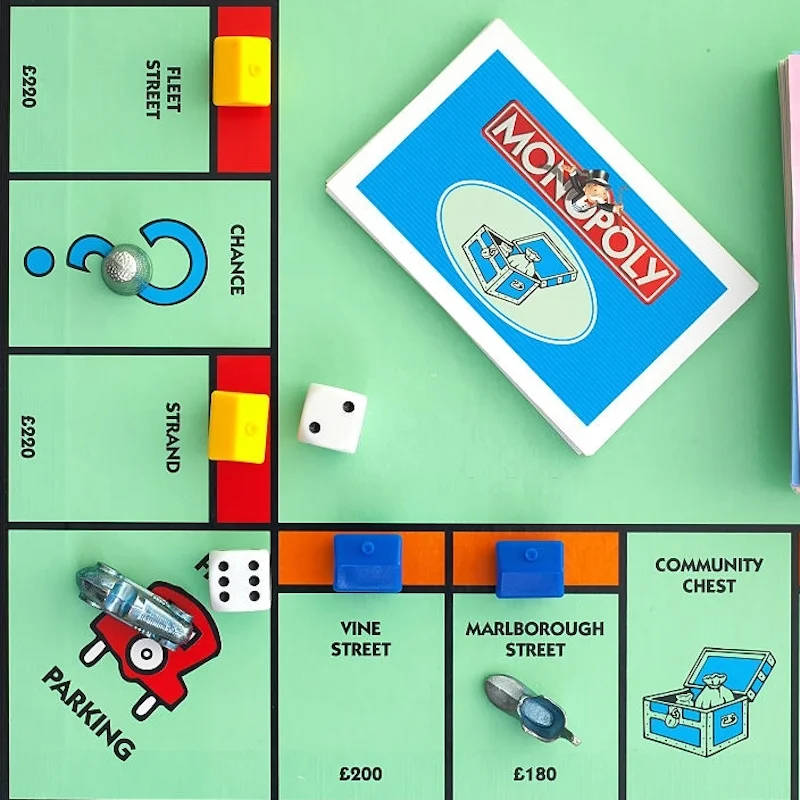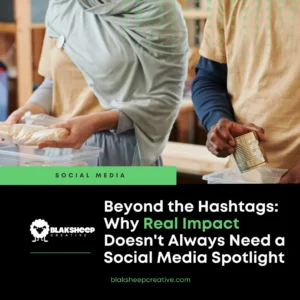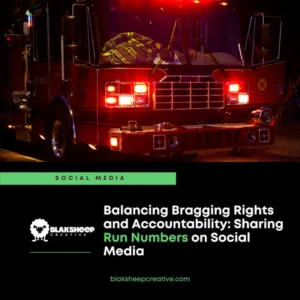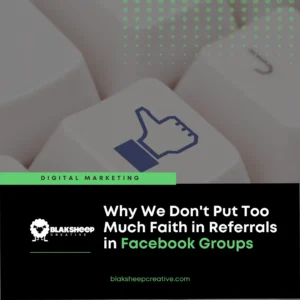Going into 2020, Facebook is still one of the most popular and practical digital marketing tools that you can use to promote your business online.
However, it is critical that you know the site’s rules, regulations, and terms of service (TOS) to stay out of the Facebook Jail.
Just one minor rule infraction could result in your business page getting blocked and possibly result in the closure of your account – causing all of your social media marketing efforts to go to waste.
After you read this post, be sure to check out 11 Essential Facebook Business Page Tips for 2020
What is Facebook Jail?
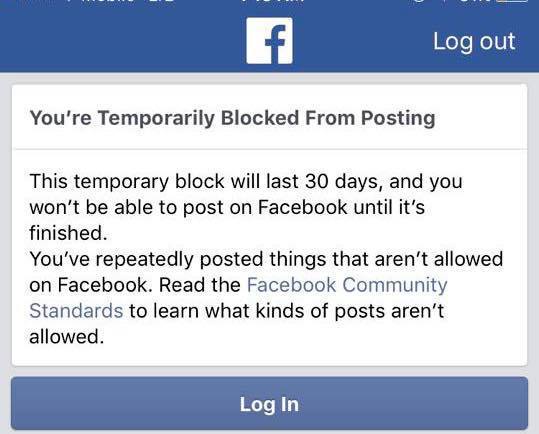
Facebook jail is when Facebook punishes an account (both personal profiles and business pages). The punishment varies according to what “law” Facebook views you as breaking.
The penalties range from being blocked from publishing for a few hours, a week, 21 days, 30 days, or, in extreme cases, the removal of your account profile or business page.
How to Avoid Facebook Jail
As you can guess from what we said before, the best way to avoid Facebook jail is to adhere to their terms of service. But who really reads those things? Fortunately for you and your business, we read them (we’re nerds like that) and will serve as your Facebook lawyer, helping you stay out (and get out if necessary) of FB jail.
Read and understand the terms of service.
Facebook has separate TOS for business pages and personal accounts. Most of the time, you can avoid the Facebook police by simply reading their list of “dos” and “don’ts” and following them. You’ve got to keep the social media tyrant happy!
Use the correct account type
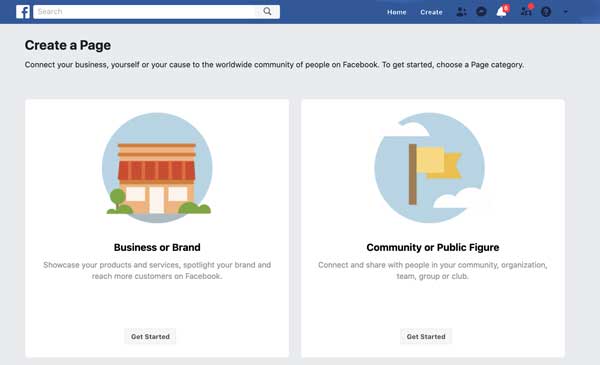
If your account is for your business, create a business page, and vice versa. It’s against Facebook’s TOS to use a personal Facebook account (“John’s Bait Shop” as the name of the account, just so you can post within groups as the name of your business.
If you’re creating a business page, learn how to create a business page for Facebook in 7 easy steps.
Profiles/Timelines are for real people and should include your real name. Be sure to use your personal name and, if your intention is to promote your business, put a link to your business page in your about section.
Don’t create duplicate personal accounts.
According to FB, each individual is only allowed to have ONE Facebook account. (We’re talking about personal accounts here). You can, however, have multiple business pages. Simply put, reference your business pages in your about section if you want to show your connection to the business.
Don’t use your personal timeline for business promotion
Let’s be real for a second. Facebook makes money through advertising. They want to give businesses a gentle nudge into using Facebook Ads. So, it stands to reason that they want to keep their thumb on marketing messages.
Accordingly, one of their biggest rules is that a personal account can’t be used for commercial purposes. Now there’s some debate about what constitutes “commercial,” but a good indicator is simply the post’s intent.
Digital Marketing 101 tells you that any business post should contain a call to action (CTA), encouraging the reader to do something. Don’t have anything that resembles a CTA on a personal post. Sure, you can tell your friends list about your business, your products, etc.
After all, it’s part of your life, right? But, if you want to keep the Facebook Gestapo away, don’t include a link where they can buy them. There’s actually a proportion that you can follow to be safe.
Be transparent about who you are
Complete your profile completely. Put actual information about yourself or your business. Use real names, real locations, and real images. This lets Facebook know that you’re real and helps build trust with your page’s followers.
Use the 9:1:1 Ratio
Ask any professional social media manager (that’s us), and they will tell you that your posts are best served like this:
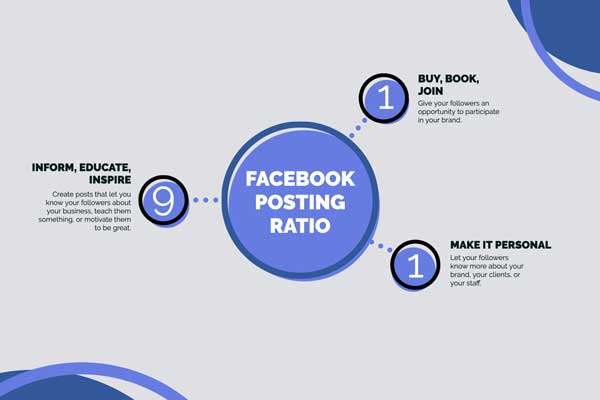
9 nonmarketing posts – educate, inform, inspire
1 promotional post – buy, book, join
1 personal – employee spotlight
Now, these are just examples of the actual post content, but you get the idea. Don’t shove your product down people’s throats. But, that’s just good business etiquette anyways.
Or try our 5-3-2 rule for social media posting.
Slow your roll – space out your posts
Don’t “machine gun,” your posts. Let things simmer a little bit.
Whether on your personal timeline, your business page, or a mix of the two, resist the urge to blast all of the various groups that you’re in with the same message. Think of the Facebook police as having a radar, and posting in rapid succession as speeding. Except to Facebook, you’re not considered a speeder, you’re considered a SPAMMER.
Whether it’s because of enthusiasm, a productivity rush, or persistence, we often end up posting identical content in multiple groups or pages at the same exact time. This behavior gets us into trouble with the “Facebook Sheriff,” as he’s on the hunt for SPAMMERS.
So how long should you wait between posts?
(puts on our Facebook Lawyer hat). Here’s a good rule of thumb. If you find it necessary to post the same content on multiple pages, keep at least 3-5 minute time intervals between postings. This allows you to appear as a real person and not an automated bot.
Use original and authorized content.
Much like Google does, Facebook wants to provide a good experience for its users. One of the ways they do this is by encouraging original content. Don’t steal from other people. Keep both your content and photos original.
Use your own content.
Don’t just ctrl-c and ctrl-v someone a competitor’s post. Your brand has its’ own story to tell; tell it in your own words. Simply spinning someone else’s content is stealing, not to mention it could be marked as spam. Too many posts are marked as spam, and boom – you’re blocked by Facebook.
Only use images you are authorized to
Resist the temptation to download an image from Google Image Search and insert it into your post. Even if you tweak it in some way and post without proper permission and licensing it could be considered an intellectual property violation (which Facebook takes very seriously). In extreme cases, the photo’s original creator/owner could even take legal action against you.
Instead, use original photos; they add authenticity to your brand. If you absolutely have to use stock images, make sure they have a Creative Commons license or similar.
Don’t act like a spammer.
Remember, Facebook wants to create a good user experience. This means that they take security and privacy very seriously. Here are some good ways to not piss your friends off and stay out of Facebook jail.
One of the key aspects of not acting like a spammer is to avoid excessive tagging and inappropriate tagging practices. To understand the dos and don’ts of tagging on Facebook, and to avoid the pitfalls of excessive tagging, check out our comprehensive guide on ‘The Ugly Side of Facebook Tagging: Lessons Learned from an Annoying Fiasco.’
Explore our guide on ‘The Ugly Side of Facebook Tagging: Lessons Learned from an Annoying Fiasco.’
Don’t send random friend requests.
Only send friend requests to people that you actually know or want to connect with. Remember, social media is all about people. Nothing will aggravate someone (and Facebook) more than random, unsolicited friend requests.
Plus, when you send someone a friend request, and they deny it, Facebook will even ask them, “do you know this person.” Too many people clicking the no button will cause you to get flagged as a spammer.
Don’t message your entire friends list at once
There’s a reason why Facebook only allows you to send private messages to only 20 people at a time. The intention is for group conversation, not for a business owner to blast out their newest sale or send unsolicited spam. If you create a massive group message, and people leave it out and mark it as spam, Facebook will throw you in their slammer.
Quit inviting your whole friends list to like your business page
We’re going to go into much more detail about this in a future post. However, you should avoid the urge to invite your entire friends list to follow and like your business’s Facebook page. Here are 2 reasons why:
- It’s aggravating – Who wants a timeline full of X invited you to like Y page? If you want to like a page, then you won’t need urging.
- It’s counterproductive – Hey, social media marketers – you’re screwing your clients, and you don’t even know it. A bunch of random, unsolicited people who like your page but don’t participate can cause your page’s posts to be shown LESS. Fewer likes with more engagement = a happy Facebook algorithm.
How to get out of Facebook Jail
Okay, so you didn’t know or learn those important Facebook terms. Perhaps you chose to roll the dice. Either way, you’ve found yourself in Facebook jail and need to get out. Use your one phone call and get in touch with us, and we’ll talk you through making bail. We’ll even do it pro bono.
You control the content on your website.
If your company doesn’t have a website, check out our pay-per-month website program to help avoid resource-draining website development costs and avoid worrying about Facebook jail.
Consider Alternative Social Media Platforms.
It seems that the recent election and political climate have caused an increasing number of profiles to be put into FB jail, causing people to flock to alternative social media platforms like MeWe and Parler. We’ve published a couple of posts on our blog to make sure you’re educated on them:
